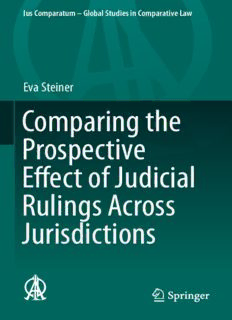Table Of ContentIus Comparatum – Global Studies in Comparative Law
Eva Steiner
Comparing the
Prospective
Eff ect of Judicial
Rulings Across
Jurisdictions
Ius Comparatum – Global Studies
in Comparative Law
Volume 3
SeriesEditors
KatharinaBoele-Woelki,UniversityofUtrecht,TheNetherlands
Diego P. Fernandez Arroyo, Institut d’Études Politiques de Paris, Sciences Po,
France
FoundingSeriesEditors
Jürgen Basedow, Max Planck Institute for Comparative and International Private
Law,Germany
GeorgeBermann,ColumbiaUniversitySchoolofLaw,USA
EditorialBoard
BénédicteFauvarque-Cosson,UniversitéPanthéon-Assas,Paris2,France
GiuseppeFrancoFerrari,UniversitàBocconi,Milan,Italy
ToshiyukiKono,KyushuUniversity,Fukuoka,Japan
MarekSafjan,CourtofJusticeoftheEuropeanUnion,Luxembourg
JorgeSanchezCordero,MexicanCenterofUniformLaw,Mexico
Ulrich Sieber, Max Planck Institute for Foreign and International Criminal Law,
Germany
Moreinformationaboutthisseriesathttp://www.springer.com/series/11943
AcademieInternationaledeDroitCompare
InternationalAcademyofComparativeLaw
Eva Steiner
Comparing the Prospective
Effect of Judicial Rulings
Across Jurisdictions
123
EvaSteiner
TheDicksonPoonSchoolofLaw
King’sCollegeLondon
London,UK
ISSN2214-6881 ISSN2214-689X (electronic)
IusComparatum–GlobalStudiesinComparativeLaw
ISBN978-3-319-16174-7 ISBN978-3-319-16175-4 (eBook)
DOI10.1007/978-3-319-16175-4
LibraryofCongressControlNumber:2015938784
SpringerChamHeidelbergNewYorkDordrechtLondon
©SpringerInternationalPublishingSwitzerland2015
Thisworkissubjecttocopyright.AllrightsarereservedbythePublisher,whetherthewholeorpartof
thematerialisconcerned,specificallytherightsoftranslation,reprinting,reuseofillustrations,recitation,
broadcasting,reproductiononmicrofilmsorinanyotherphysicalway,andtransmissionorinformation
storageandretrieval,electronicadaptation,computersoftware,orbysimilarordissimilarmethodology
nowknownorhereafterdeveloped.
Theuseofgeneraldescriptivenames,registerednames,trademarks,servicemarks,etc.inthispublication
doesnotimply,evenintheabsenceofaspecificstatement,thatsuchnamesareexemptfromtherelevant
protectivelawsandregulationsandthereforefreeforgeneraluse.
Thepublisher,theauthorsandtheeditorsaresafetoassumethattheadviceandinformationinthisbook
arebelievedtobetrueandaccurateatthedateofpublication.Neitherthepublishernortheauthorsor
theeditorsgiveawarranty,expressorimplied,withrespecttothematerialcontainedhereinorforany
errorsoromissionsthatmayhavebeenmade.
Printedonacid-freepaper
SpringerInternational PublishingAGSwitzerlandispartofSpringerScience+Business Media(www.
springer.com)
Foreword
Thissurveyofthetemporaleffectsofjudicialdecisionsindifferentjurisdictionsis
welcome on several grounds. It deals with an unusual, indeed wholly exceptional
situation: that in which a court finds it necessary to limit the temporal effects of
its decision. Yet the practice of temporal limitations raises interesting questions
of general importance. Moreover, while the practice is found in many, but by no
means all, legalsystems, there seems to be little commongroundon the scope of
thepractice,orindeedonitsrationale.
The most understandable category of cases is perhaps that where a court is
competent to strike down legislation: a competence which is necessary in federal
systems and in the European Union but which is increasingly common in other
jurisdictions.Insuchcases,thecourtmaybeexplicitlyauthorisedtolimittheeffects
ofitsjudgement,asistheCourtofJusticeoftheEUinthecaseofEUregulations;or
eventosuspendtheeffectsofitsjudgement,asistheFederalConstitutionalCourt
inGermany;andthispracticeofsuspensionisfrequentlyadoptedbytheSupreme
CourtofCanada.
Buttemporallimitationsmayalsobefoundwherecourts(normallythehighest
courtsinthesystem)deemitnecessarytooverrule,ortodepartfrom,earlierjudicial
decisions, as with prospective overruling,as adopted by the U.S. Supreme Court.
Such temporal limitations may be regarded as justified where the consequences
would otherwise cause injustice or severe harm, generally social, economic or
financial.Orindeedsuchlimitationsmaybeconsiderednecessarywhere,fordiverse
reasons,theinstantdecision,ifnotlimitedinitstemporaleffects,wouldhavesuch
adverseconsequences.
Itisdifficulttocategorisethesituationswherethequestionoftemporallimitation
properlyarises,andtoassesstheadvantagesanddisadvantages.Buttheissuesare
so well explored by Eva Steiner in her opening chapter and by the authors of the
reports on the legal systems surveyed in this book that the temptation to discuss
them in this foreword must be resisted. Suffice it to say that readers of the book
willfindmuchofinterestincomparingthedifferentnationalsystems.Theywillbe
v
vi Foreword
ledtoreflectonthepracticalaspectsofthetopicandthedifficultiesarising,andon
jurisprudentialand constitutional issues, including such matters as the role of the
courts,the natureofthe judicialfunction,the role ofprecedentas a sourceof law
and more widely the separation of powers between legislature and judiciary. This
bookisthusavaluablecontributiontolegalpracticeandtolegaltheory.
December2014 FrancisG.Jacobs
Contents
1 JudicialRulingswithProspectiveEffect-fromComparison
toSystematisation .......................................................... 1
EvaSteiner
PartI EuropeanJurisdictions
2 The Prospectiveand RetrospectiveEffect ofJudicial
DecisionsinIreland ........................................................ 27
NiamhConnolly
3 Effects in Time of Judgments in the Netherlands:
ProspectiveOverrulingandRelatedTechniques........................ 65
C.H.vanRheeandWytzevanderWoude
4 TheAbilitytoDeviatefromthePrincipleofRetroactivity:
AWell-EstablishedPracticeBeforetheConstitutional
CourtandtheCouncilofStateinBelgium .............................. 81
SarahVerstraelen, PatriciaPopelier,
andSébastienVanDrooghenbroeck
5 ChangingtheCaseLawprofuturo–APuzzleofLegal
TheoryandPractice........................................................ 115
AdamSagan
6 TowardsaSophisticatedTheoryofPrecedent?Prospective
andRetrospectiveOverrulingintheCzechLegalSystem............. 143
ZdeneˇkKühn
7 TheRoleofCaseLawandtheProspectiveOverruling
intheGreekLegalSystem................................................. 163
AntoniosKarampatzosandGeorgiosMalos
vii
viii Contents
8 The Portuguese Experience of Judge-Made Law
andthePossibilityofProspectiveIntentionsandEffects............... 185
JoséManuelArosoLinharesandAnaMargaridaGaudêncio
9 JudicialRulingswithProspectiveEffectinItaly........................ 203
MicheleTaruffo
PartII North-AmericanJurisdictions
10 RetroactivityandProspectivityofJudgmentsinAmericanLaw ..... 209
RichardS.Kay
11 Canada:TheRiseofJudgmentswithSuspendedEffect............... 247
LionelSmith
PartIII South-AmericanJurisdictions
12 JudicialRulingswithProspectiveEffectinArgentina ................. 263
AlejandraRodríguezGalán
13 JudicialRulingswithProspectiveEffectinBrazilianLaw ............ 285
HumbertoDallaBernardinadePinho
14 JudicialRulingswithProspectiveEffectinVenezuela ................. 313
HildegardRondóndeSansó
PartIV Asian-OceanianJurisdictions
15 JudicialRulingswithProspectiveEffectinAustralia .................. 349
JamesDouglas,EleanorAtkins,andHamishClift
16 Prospective Overruling in Singapore: A Judicial
FrameworkfortheFuture? ............................................... 359
GaryK.Y.Chan
Judicial Rulings with Prospective Effect- I.B. General
LegalTheory-19thCongressoftheInternationalAcademia
ofComparativeLaw-Vienna2014.............................................. 381
About the Contributors
GaryK.Y.ChanisanAssociateProfessorattheSMUUniversity,SchoolofLaw
(Singapore).
Dr.NiamhConnollyisanAssistantProfessoratTrinityCollegeDublin,Schoolof
Law(Ireland).
Humberto Dalla Bernardina de Pinho is an Associate Professor at the Rio de
JaneiroState University(Brazil)andAttorneyGeneral’sAssistantforthe State of
RiodeJaneiro.
Dr.HildegardRondóndeSansóisEmeritaProfessorattheCentralUniversityof
Venezuela,FacultyofLaw(Venezuela)andJudgeattheVenezuelanCorteSuprema
deJusticia.
JamesDouglasisJudgeattheSupremeCourtofQueensland(Australia).
Dr.AlejandraRodríguezGalánistheProfessorofConstitutionalLawattheUni-
versityofBuenosAires(Argentina)andGeneralSecretarie,AsociaciónArgentina
deDerechoComparado.
Ana Margarida Gaudêncio is an Assistant Professor at the Coimbra University
SchoolofLaw(Portugal)andafoundingmemberofthePortugueseAssociationfor
Theoryand Philosophyof Law andfor SocialPhilosophy(the Portuguesesection
oftheInternationalAssociationforLegalandSocialPhilosophy,orIVR).
Dr.AntoniosKarampatzosisanAssistantProfessorinPrivateLawattheNational
andKapodistrianUniversityofAthens,LawSchool(Greece)andAttorney-at-Law.
Richard S. Kay is the Wallace Stevens Professor of Law and Associate Dean
for Research and Faculty Development at the University of Connecticut School
ix
Description:This work deals with the temporal effect of judicial decisions and more specifically, with the hardship caused by the retroactive operation of overruling decisions. By means of a jurisprudential and comparative analysis, the book explores several issues created by the overruling of earlier decisions

